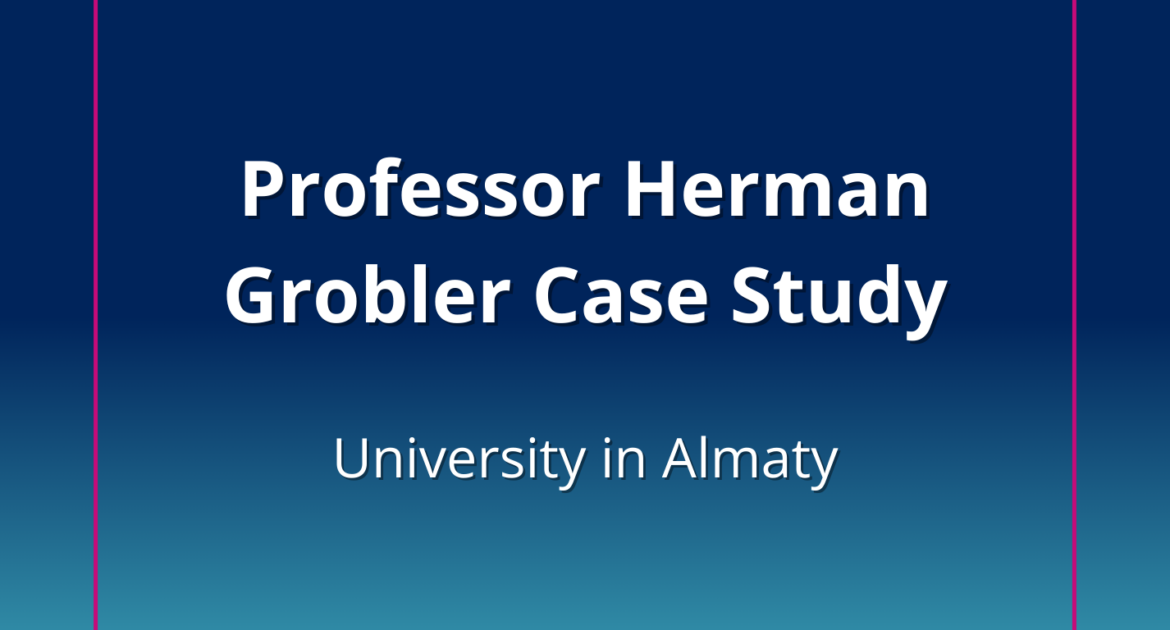This academic case study focuses on the career of Professor Herman Grobler, who is currently a professor in the Psychology Department at KIMEP University in Almaty, Kazakhstan. In this case study, he shares his academic journey, research interests, and key insights from his work.
Originally from South Africa, Professor Grobler began his academic career there before moving to KIMEP University in Almaty, Kazakhstan. Professor Grobler’s research centres on mental health and well-being. He is currently part of a team investigating teacher burnout in Kazakhstan, with a particular focus on cultural identity. Alongside his role at KIMEP University, he is also affiliated with North-West University in South Africa, where he collaborates on research projects and co-supervises postgraduate students. One of his key research areas explores Child and Adolescent Reproductive Health.
The video below provides further insights into Professor Grobler’s career, where he shares advice and guidance on pursuing a career in academia.
Case Study Transcript
1. Could you tell us about your role at KIMEP and how you got into it?
It was a long and interesting journey, but it all started when a colleague from South Korea emailed me about a job opportunity that seemed like a perfect fit. I decided to apply, and the rest is history.
2. What do you enjoy most about your work at KIMEP?
The people—my colleagues—are a huge part of what I enjoy. Connecting with them, getting to know them, and learning from them is incredibly rewarding. I also appreciate the freedom to be myself and the space to grow professionally. I design the courses I teach within the broader curriculum framework, and having that level of autonomy is something I really value.
3. How would you describe life and work in Kazakhstan, and how has the experience influenced your career, ambitions, and contributions to the academic and local community?
I love the fact that I have the freedom to walk around at any time of the day and spend quality time with my family. There are great places to run, plenty of coffee shops and restaurants, and overall, it’s a very family-friendly city—which I really appreciate.
This sense of community also ties into my work at KIMEP. Being part of the local culture and integrating with it has given me incredible opportunities to further my research in community-based interventions. I conducted a lot of similar research in South Africa, and I’m eager to continue that here. Connecting with local colleagues in Psychology has been invaluable, and I truly appreciate their insights.
4. What advice would you give to early-career academics interested in working internationally, especially in Kazakhstan?
Relationships are key. My advice would be to genuinely connect with people, get to know them, and understand their interests. See if your research interests align, as this is essential for collaboration, research projects, and meaningful community work. Building strong relationships helps you become part of the bigger picture.
5. What advice would you give to your younger self?
Don’t be a perfectionist. The perfect opportunity doesn’t exist, and waiting for it can mean missing out on valuable experiences. Take chances, embrace opportunities when they come, and don’t wait for circumstances to be ideal. Just go for it!
6. How do you stay current in your field, and what trends or developments are you most excited to bring into the classroom?
I read—a lot. As an academic, I should love reading, but I have to admit that sometimes it feels like a chore because there’s so much of it! I keep up with recent developments in my field, and I also make a point of listening to my colleagues. You can learn so much from others, and being part of a collaborative team often introduces you to ideas you wouldn’t have come across otherwise.
Beyond the usual academic reading and podcasts, networking and collaboration are essential. Engaging with others in my field keeps me informed and constantly learning.





Leave a Reply